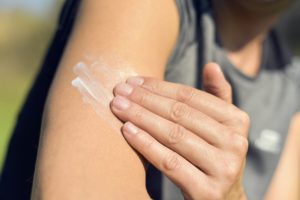
UV rays have been known to increase the risk of skin cancer and speed up skin aging, but researchers were intrigued to better understand the relationship between UV rays and the performance of blood vessels in the skin.
Previous studies have shown that UV rays influence how blood vessels in the skin behave, explicitly reducing the level of vasodilation which nitric oxide mediates.
Nitric oxide is important to help relax the blood vessels, which increases blood flow.
Vasodilation of the skins blood vessels is necessary to keep the body cool and maintain proper temperature. All skin types are able to produce nitric oxide, but a chemical known as 5-methyltetrahydrofolate (5-MTHF) helps this process. Researchers believe that UV rays reduce 5-MTHF availability, which decreases vasodilation.
Researchers looked to determine how sunscreen can play a role in blocking UV rays to prevent the reduction of 5-MTHF.
The study involved 13 healthy participants. One arm was exposed to UV rays, and the other arm was not. Each participant underwent three tests: UV alone, UV with sunscreen, and UV with sweat.
The arm exposed to UV rays with sunscreen and with sweat did not show a reduction of nitric oxide vasodilation. Wearing sunscreen was also associated with boosted vasodilation compared to the sweat arm and control arm.
First author S. Tony Wolf said, “For those who spend a lot of time working, exercising, or participating in other various activities outdoors, using sunscreen may protect not only against skin cancer but also against reductions in skin vascular function.”
Aside from promoting vasodilation, wearing sunscreen is always important to help protect the skin and slow down the appearance of aging.